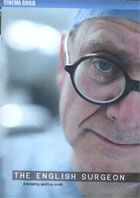
The English Surgeon 2007
Distributed by Cinema Guild, 115 West 30th Street, Suite 800, New York, NY 10001; 212-685-6242
Produced by Geoffrey Smith
Directed by Geoffrey Smith
DVD, color, 93 min.
College - Adult
Health Sciences
Date Entered: 11/03/2009
Reviewed by Lori Widzinski, Health Sciences Library, University at Buffalo, State University of New YorkRenown British neurosurgeon Henry Marsh went to Kiev in 1992 as a visiting physician to perform brain surgery—his specialty being brain tumors. When he found a broken, outdated medical system he was moved to try to help fix it. Basically told to “go away,” he met Ukrainian neurosurgeon Igor Kurilets, quite by chance, and it was the beginning of a partnership that has helped thousands of Ukrainian patients.
Battling professional rivals, political pressures, lack of funding and antiquated medical facilities, Kurilets and Marsh persevere, with Kurilets running a not-for-profit clinic for neurosurgical cases and Marsh visiting from Britain periodically to perform surgeries. The English Surgeon chronicles one of Marsh’s trips to Kurilets’ clinic.
The film follows the case of Marian Dolishny who has a brain tumor that is causing epilepsy. Marian’s case opens up the heart of the film by allowing us an intimate view of the connections between neurosurgeon’s world and the patient’s world. The trappings might be less than what we are used to seeing in the West, but the center of the patient/physician contact is the same. As a surgeon, the struggle for Henry, because he is a good, decent, feeling human being, is to deliver his gift—his skill as a surgeon and balance it with the particular circumstances of the patient. Watching Marsh and Kurilet agonize over delivering devastating news to a parent, or to a young, beautiful, seemingly healthy woman, after they must have been in this situation hundreds, if not thousands of times before is the perfect illustration and testimony to their humanity. Humanity in its many forms is a central theme of the film. Scores of people line up to see Dr. Marsh when he comes to Kiev, becoming an allegory for the other main premise of the film—hope.
The climax of the film is watching Marian’s amazing surgery. Everything that Drs. Marsh and Kurilet work for is epitomized in this scene. The previous eloquent discussions on the nature of being a doctor and being human, the struggles of medical ethics, the medical procedure itself—from the noise the drill will make and the fact that Marian must remain awake during it—all come together here. Marian’s surgery is a success, but running the background is the secondary story of Tanya, a young girl that Dr. Marsh lost, and his decision about treating her haunts him daily.
This documentary is exceedingly well done, and aired on PBS’ POV series. In addition to wonderful filming, it has a lovely original soundtrack. It is highly recommended for library collections supporting the health sciences, particularly those supporting medical and nursing programs, but it is accessible enough for the general public. Medical students considering the field of neurosurgery will find this of particular interest.